MOVING FORWARD TOGETHER
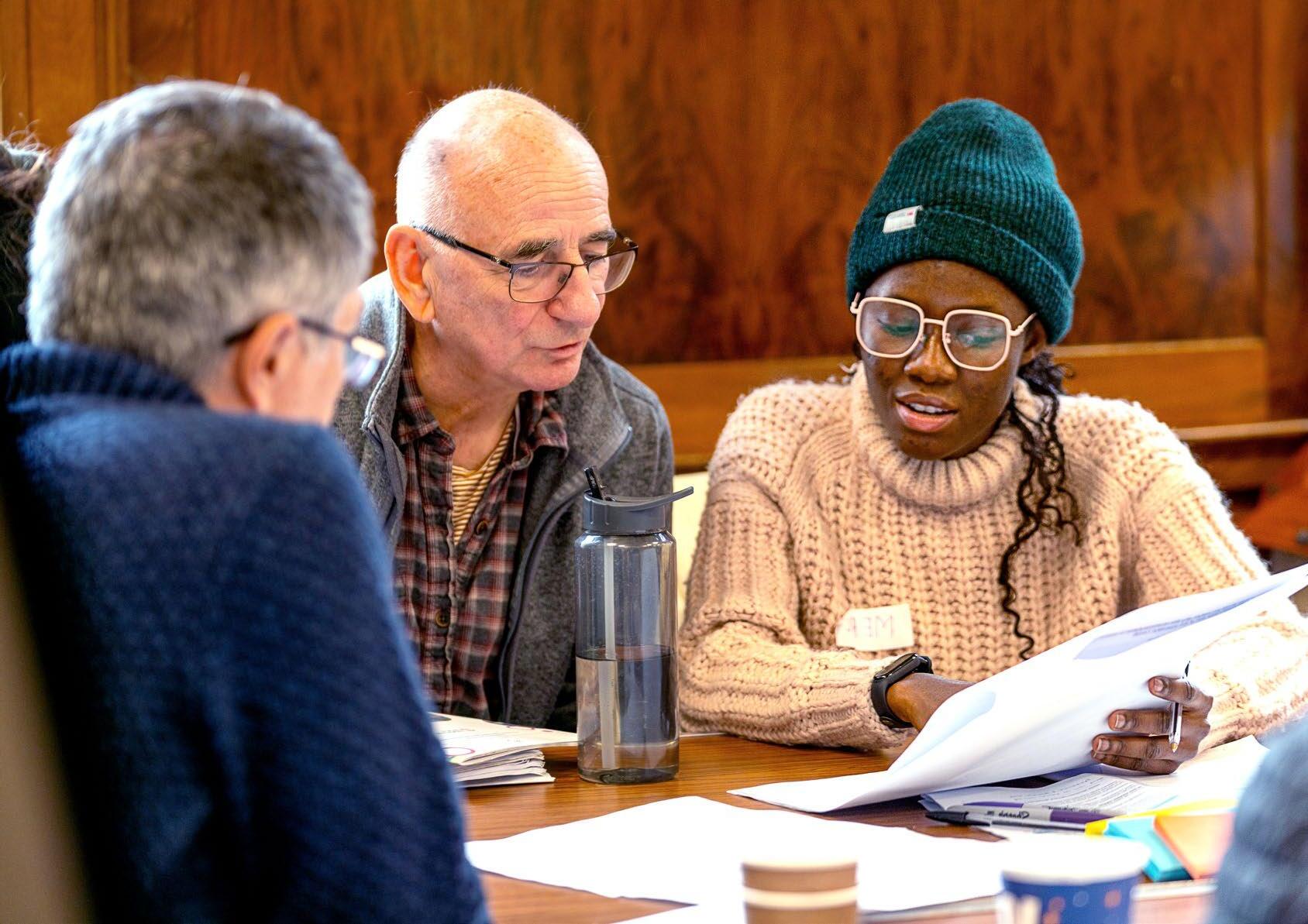
ANNUAL REPORT 2023/24
Readying politicians, people and systems for a new deliberative democracy


ANNUAL REPORT 2023/24
Readying politicians, people and systems for a new deliberative democracy
Involve is the UK's leading public participation charity. We work to make public participation and deliberation an integral, everyday part of democracy, to help solve the challenges of the 21st century.
Since 2003, we have been working with governments, parliaments, civil society, academics and the public to realise new forms of public participation that revitalise democracy and improve how decisions are made.


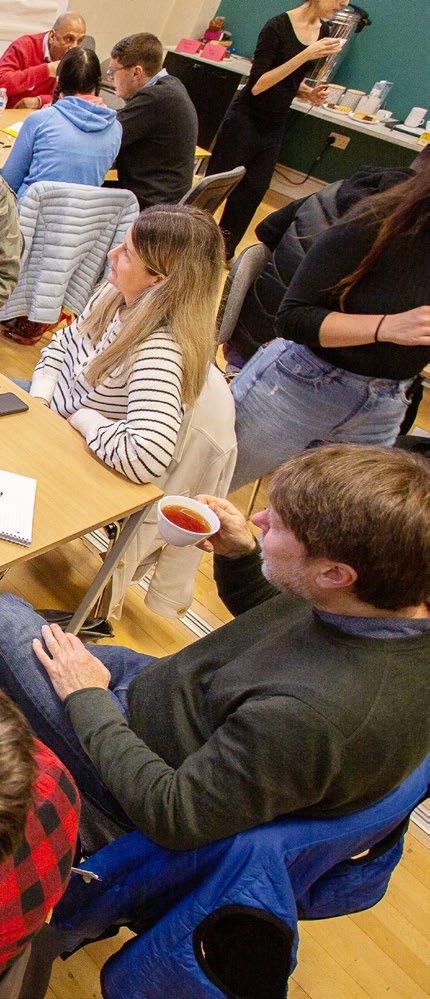
We want to build a more vibrant democracy, where everyone can shape a society that works for all of us.
We need to make important choices as a society. But, most people don’t have enough say in the decisions that affect their lives. Existing power structures mean that some groups of people have less influence than others. Decision-makers struggle to tackle complex policy problems. And many people no longer trust in politics to get the job done.
We know things can be done differently every day we see that when given the assurance that their views will make a difference and enough evidence and time, everyday people can help take on difficult questions, avoid political divides, and deliver sensible answers to the big challenges of our time.
Our work is focused on three areas:
Working closely with thousands of people in all four nations of the UK to design and deliver innovative participatory and deliberative processes that influence decisions and help this approach become the norm.
Building the capacity of those making decisions, and developing the body of evidence, principles and standards that support participatory and deliberative best practice.
Communicating why participation and deliberation are essential features for a healthy modern democracy, and ensuring those in positions of power and influence understand and support their use.
We are a dynamic team of 25. We are experts in participatory and deliberative democracy, public engagement, governance, facilitation, policy-making, research, networks, advocacy, strategy and much more.
We also work closely with a number of skilled associates and partners who enhance our communications, facilitation, project management and research work.
• Sarah Castell (Chief Executive Officer)
• Gareth Bridges (Director of Finance & Support Services)
• Calum Green (Director of Advocacy & Communications)
• Sarah Allan (Former Director of Capacity Building & Standards) Appointed Director of Climate Programmes September 2023
• Carly Walker-Dawson (Director of Capacity Building & Standards) Appointed September 2023
• Steph Draper (Interim Director of Innovation & Practice) Appointed July 2023
Our Board of Trustees bring a vast amount of varied knowledge and experience from national and local government, parliament, civil society, academia, politics, business and think tanks. During the year and up to the date of this report were as follows:
• Claire Ainsley
• Paul Braithwaite
• Andrew Cave
• Edward Cox (Chair)
• Dr Temidayo Eseonu
• Delaweh Hamelo-Mensah
• Kathy Jones
• Julie Mellor (Resigned August 2023)
• Sharon Squires
• Hannah White (Deputy Chair)
We are a registered charity in England and Wales (1130568), and Scotland (SC047314). Our charitable objectives are:
To advance education for the public benefit in methods and processes of public participation and democratic practice;
To promote good citizenship for the public benefit by encouraging and facilitating participation by the public in democratic and decision-making processes with an intended outcome of enabling people to develop their capacities, help meet their needs and participate more fully in society.
We would like to thank our staff and everyone we have worked with this year. We couldn't have achieved our ambitious goals without the valuable support of politicians, public servants, our funders, partners, and Board of Trustees.
Our work wouldn't be possible without the contributions of the many members of the public who participate in our processes. We would particularly like to thank the people from across the UK, from all walks of life, who have generously given up their time and energy this year to improve decision making and strengthen our democracy.
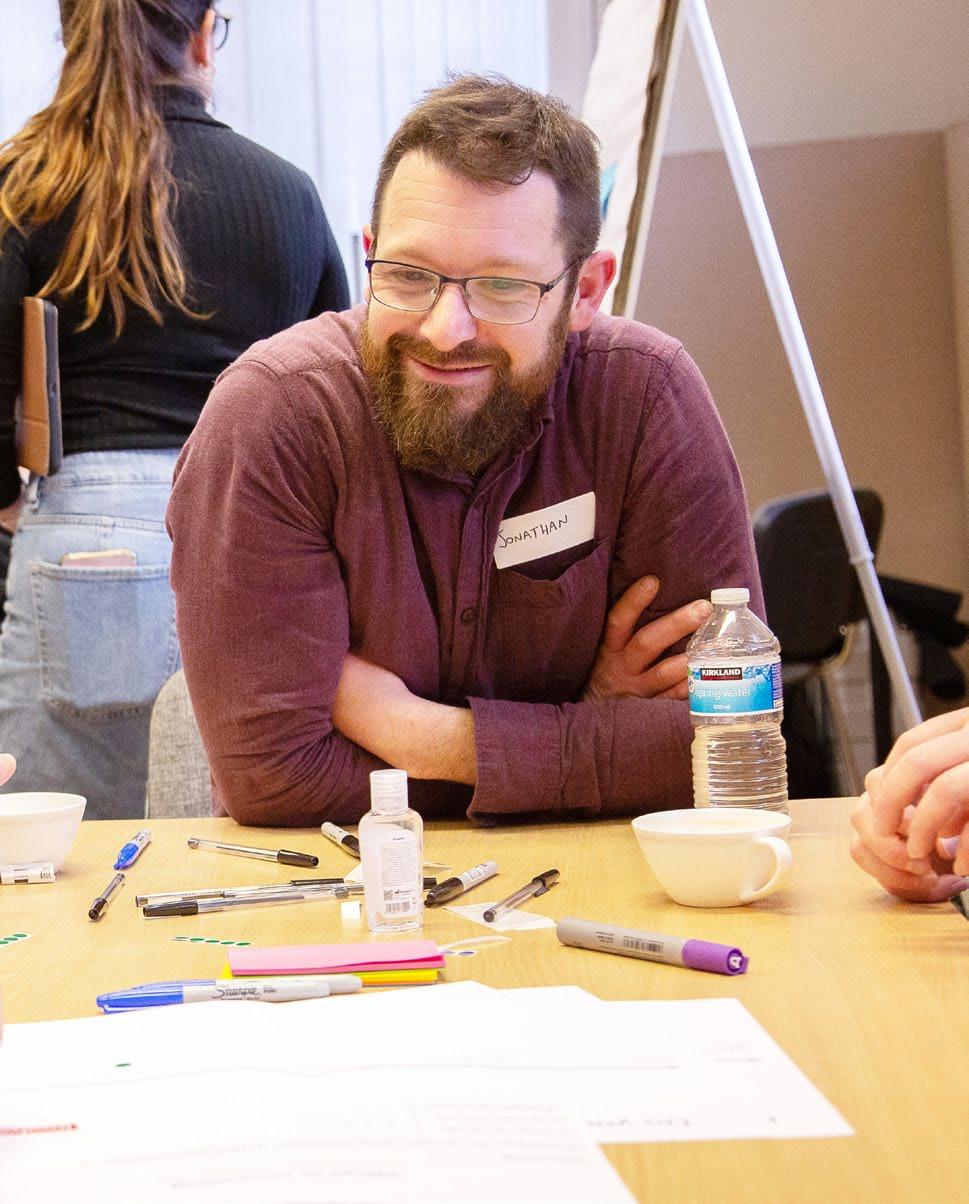
This year, our work has shifted, towards more institutional, everyday participation and deliberation.
• More hours with people, more depth, with more long term panels
• More individual projects – 66 projects funded by grants and consultancy, working with both the public and decision makers
• More training and capacity building than ever before
29,801 hours
of participation, deliberation and training in how to do both
2,407 participants
Our online resources were also visited and used over
247,000 times
j
• Scotland-wide
• Belfast
• Mid Antrim
• Sunderland
• Selby
• Sheffield
• West Midlands
• Warwick District
• North Felixstowe
• Essex
• London Borough of Hackney
• London Borough of Hounslow
• London Borough of Waltham Forest
• The Royal Borough of Greenwich
• The Royal Borough of Kensington and Chelsea
• Westminster
• Southampton
• Bristol
• Cornwall
• Guernsey
• England-wide
• UK-Wide
• Albania
• Croatia
• Art27
• Barrow Cadbury Trust
• Belfast City Council
• British Academy
• British Embassy Albania
• Calouste Gulbenkian Foundation
• Camden Council
• Care Quality Commission
• Climate 2025
• Cornwall Council
• CitiREDI
• DHULC (Department for Levelling Up, Housing and Communities)
• East Suffolk Council
• Electoral Reform Society
• Environment Agency
• Esmee Fairbairn Foundation
• ESRC (Economic and Social Research Council)
• Greater London Authority
• Guernsey Health Improvement Commission
• Hanover Health
• Impact Investing Institute
• Innovate UK
• JRRT
• JRSST-CT
• John Ellerman Foundation
• Kings College London
• Lancaster University
• LDA Design
• LOTI (London Office of Technology and Innovation)
• London Borough of Camden
• London Borough of Greenwich
• London Borough of Hackney
• London Borough of Hounslow
• London Borough of Waltham Forest
• Manchester City Council
• NERC (Natural Environment Research Council)
• National Lottery Communication Fund
• New Economics Foundation
• Northern Gas Networks
• Nuclear Waste Services
• OECD (Organisation for Economic Co-operation and Development)
• Prime PLC
• Queens University Belfast
• Royal Academy of Engineering
• Royal Borough of Greenwich
• Royal Borough of Kensington & Chelsea
• RSA (Royal Society for the encouragement of Arts, Manufactures and Commerce)
• RSPB (The Royal Society for the Protection of Birds)
• Scottish Government
• Scottish Wildlife Trust
• Sheffield City Council
• Southampton University
• SONI (System Operator for Northern Ireland)
• St Stephens Green Trust
• Sunderland City Council
• Transparency International
• UK Research and Innovation (UKRI)
• University of Birmingham
• University of Gloucestershire
• University of Southampton
• Up for Yorkshire
• West Midlands Combined Authority (WMCA)
• Westminster City Council
• WWF (World Wide Fund for Nature)
2024, the world goes to the polls – and it’s time for UK democracy to evolve.
When I became chair of Involve, there was little on the national stage that could be described as democratic reform. Metro mayors have been perhaps the most refreshing change to English democracy we have seen. And yet compared with their US or continental counterparts, even these mayors lack significant powers and autonomy to really make a difference to their places, without needing the goahead from Westminster and Whitehall.
Internationally, the picture over the past decade has been different. Governments all around the world have not only experimented with, but increasingly work with deliberative institutions. The OECD tell us that from 2020 to 2023 the number of institutional assemblies grew from 22 to 41, the majority of which are carried out locally or regionally.
And in a year where 70 countries will go to the polls and 2 billion people will have the chance to vote, the UK will hold its own General Election. There is the prospect that a refreshed government will have a serious interest in democratic reform.
This year 2023–24, Involve has focused on readying the public, politicians, and officials for this reform to come. Our job was simple. Keep the work going. Keep the work growing. Keep innovating.
We have continued to deliver the Sciencewise programme – where public dialogue has been able to inform thinking on everything from genome editing to AI.
We have continued to support the Scottish government with its work to develop a citizens minimum income guarantee. In Northern Ireland we’ve worked with citizens on a range of pressing issues, from renewable energy infrastructure to the environmental factors affecting health.
We have developed and deepened our work with local authorities, for instance on Camden's Climate Panel and Housing and Property Panel, as well as on the Grenfell Support Programme.
Involve has become a national – indeed global – leader in putting citizens at the heart of tackling climate change and environmental degradation. We have taken climate change out of the technical sphere and made it a matter of public opinion and deliberation.
And perhaps most importantly we have worked to understand our impact better so that we can focus our energy where it brings the greatest results.
While we get ready for the democratic transformation we yearn for on the national stage, we are developing new democratic instincts with the wider ecosystem. We are nurturing democratic muscle-memory amongst a growing number of citizens who take part and enjoy their engagement. And we are part of an international movement, where eventually the feedback loops will be too strong for this little island nation to resist.

"Involve has become a national – indeed global – leader in putting citizens at the heart of tackling climate change and environmental degradation."
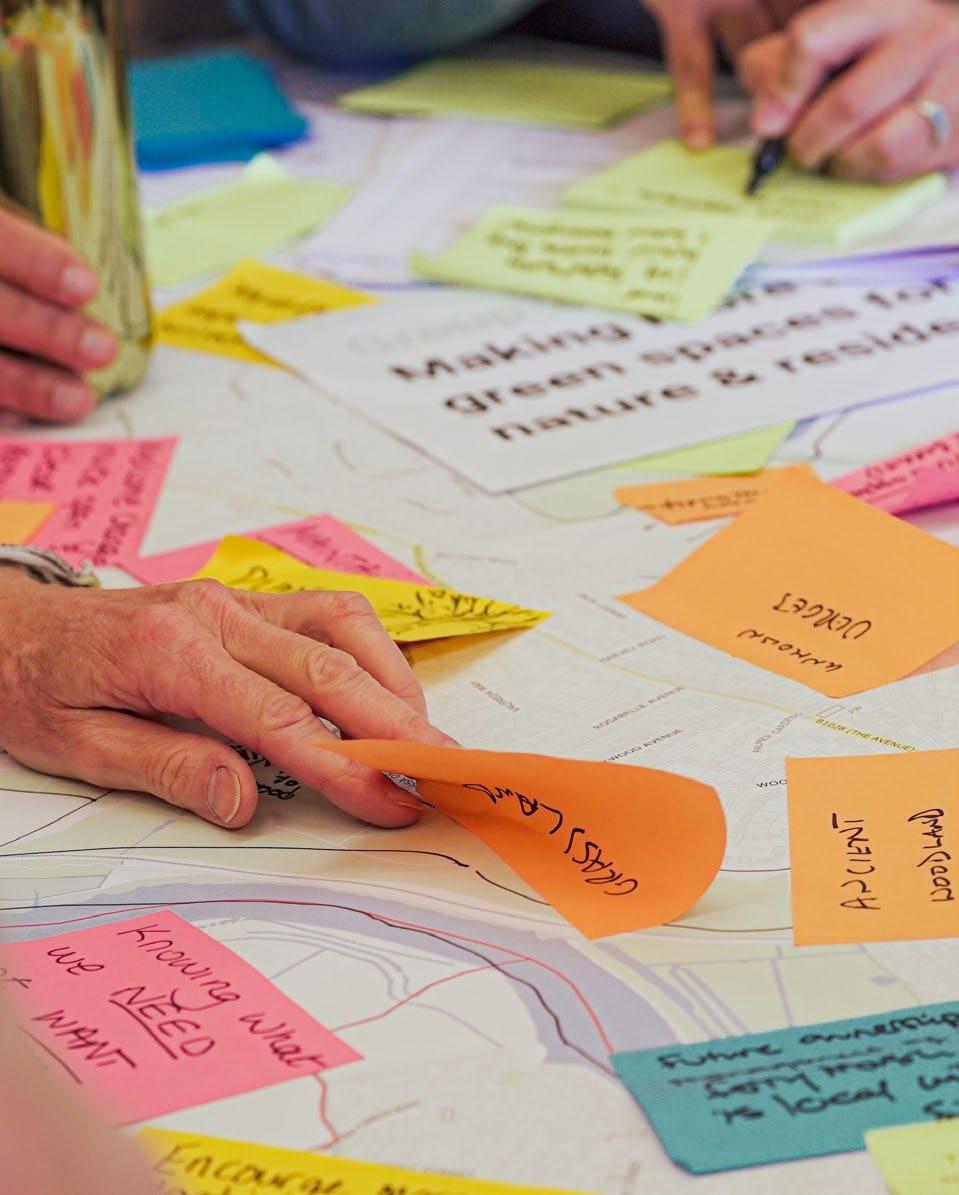
Involve has a vision of a vibrant democracy, where everyone can shape a society that works for us all.
Our own work stimulates change towards this world, but our progress is not simple or linear. We work in a complex system. And we know we can’t do this alone, the work of others plays a big part.
Economic change, geopolitical forces and social trends shape our environment. Institutions, and the policies and behaviours of decision makers there affect how far people can have a say. Political events create both opportunities and setbacks. And the support of the media, interest groups and the public themselves are the context for change.
In 2023–2024 we developed an impact framework. We wanted to better identify, describe, evidence and learn from the different kinds of changes to which our work contributes.
The framework (in which we gratefully draw on the work of KNOCA as well as on our own internal work) identifies several kinds of change we would expect to notice, as a result of Involve’s work.
Decision makers
Institutions
• Changes from taking recommendations from the public, on policy, strategy, legislation, regulation
• Willing to be changed
• Aware of and understanding the value in participation and deliberation
• Readiness to act
• Skills in methods
• Access to, awareness of resources and standards
Wider Society
• Ongoing change from embedding more processes of participatory and deliberative democracy
• Institutionalised ways of using participation in decision making, and awareness of processes
• Processes and practices in the institution which allow for new perspectives, alternative points of view, holding space to engage people
• Participation and deliberation recognised as essential features for healthy modern democracy
• Practical action in the system
Use of resources, best practice and standards
• Expertise and resources available to tackle democratic problems in society
• Changes in decision making – from individual decisions taken on recommendations from a deliberative process, to longer term ways of making decisions differently
• Changes in mindsets, understanding the ways of being which enable the shift to deliberative and participatory ways of doing things
• Changes in capacity and resourcing which build the ability and skill to make the change happen
• Decision Makers – including the people who directly use our work, inside state institutions or elsewhere
• Institutions themselves; including non state actors and civil society, state institutions and the ways they work
• Wider society including commentators, the public, other actors
This work has helped us identify where we have made a difference, through our processes, our training, our mentoring and capacity building, and our advocacy and evidence production.
This report starts the process of sharing stories of how these differences have been made. We are learning as we go. Next year, we will depend on our understanding of impact through this framework and adapt our work on the basis of what we learn.
The next sections tell stories of the work we have done and the impact it has achieved. It complements our Statutory Trustees’ Report and Audited Accounts for 2023/24, which you can find on our website.
• Worked with 25+ government departments, public bodies and local authorities
• 25+ public policies, strategies and frameworks informed and influenced
• Convened and supported democracy organisations to launch a public-facing coalition campaign for democratic renewal
• 2 Permanent Secretaries established as sponsors of participatory methods
• 80+ senior civil servants and parliamentary officials active in the participatory methods forum, with hundreds of civil servants reached with guidance on best practice public engagement
• 5+ assembly participants became ongoing advocates
• Research found lasting positive mindset shifts among participants in the People’s Assembly for Nature, with participants maintaining stronger knowledge, behaviours, and connections to nature, and showing continued belief in citizens’ assemblies as a way for people to shape decisions
• Provided training and mentoring to 21 local authorities to undertake high quality public engagement in climate decision making
• Supported Parliamentary Select Committee clerks to develop a strategy for participation
• Facilitated a knowledge exchange ahead of Albanian parliament-commissioned deliberative process
• Created guidance for public sector organisations to adopt good public engagement practice
• Trained over 200 people in deliberative engagement and facilitation skills across diverse sectors
• Mentored 150 individuals to enhance their public engagement practices
• Began partnership with CQC to assess and improve public engagement in health and care systems
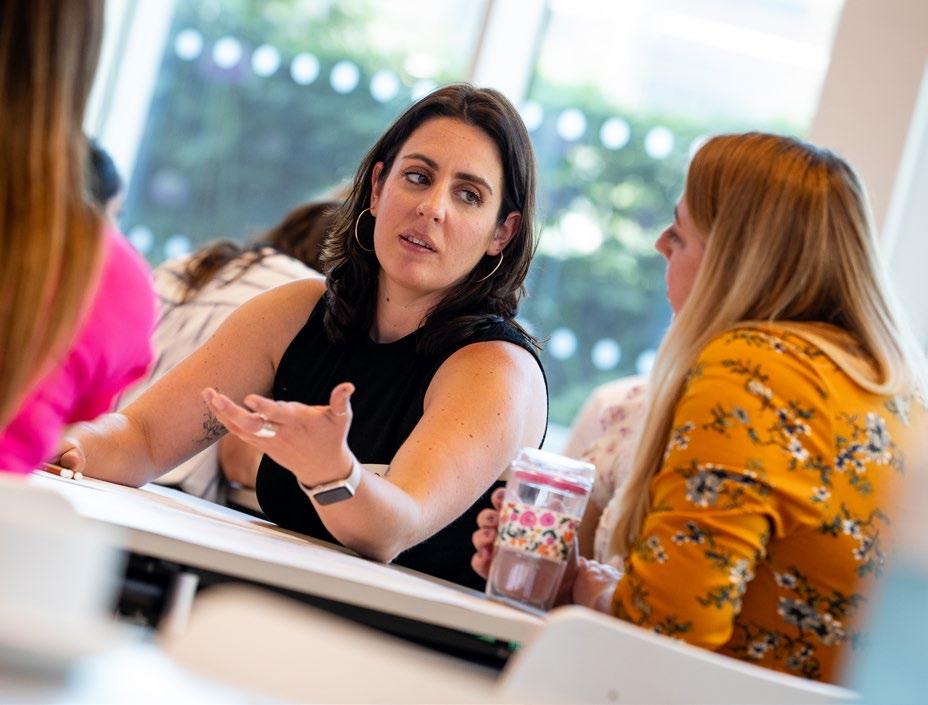
Our capacity building offer supports decisionmakers, commissioners, and practitioners with training and tools for effective public engagement in decision making. This year, we expanded our reach across sectors, including local, national, and devolved government, statutory organisations, private sector, arts and culture, academia, and charitable foundations.
We launched Fostering Impact: An investor guide for engaging communities in placebased impact investing in September 2023, in collaboration with the Impact Investing Institute. The guide helps investors enhance their impact by partnering with local communities. This work highlights how public engagement in decision making can be applied to a range of sectors beyond governmental institutions, with outcomes that can fundamentally shape communities and people’s lives.
In early 2024, we introduced mini masterclasses on deliberative engagement and facilitation skills, making training more accessible. We trained over 200 individuals from diverse sectors and provided mentoring to around 150 people. Highlights included training the Department for Levelling Up, Housing and Communities' race and equity team and collaborating with Art27 Scotland, supporting them to think about how to build public engagement into their work on cultural rights and their Festival of Migration.
We hosted a delegation from the Albanian Parliament in Edinburgh for a knowledge exchange with the Scottish Parliament, supporting preparations for Albania's first parliament-commissioned deliberative process in autumn 2024.
We partnered with the Care Quality Commission to support them to understand what good public engagement practice looks like in order for the CQC to meaningfully assess health and social care providers’ engagement efforts.
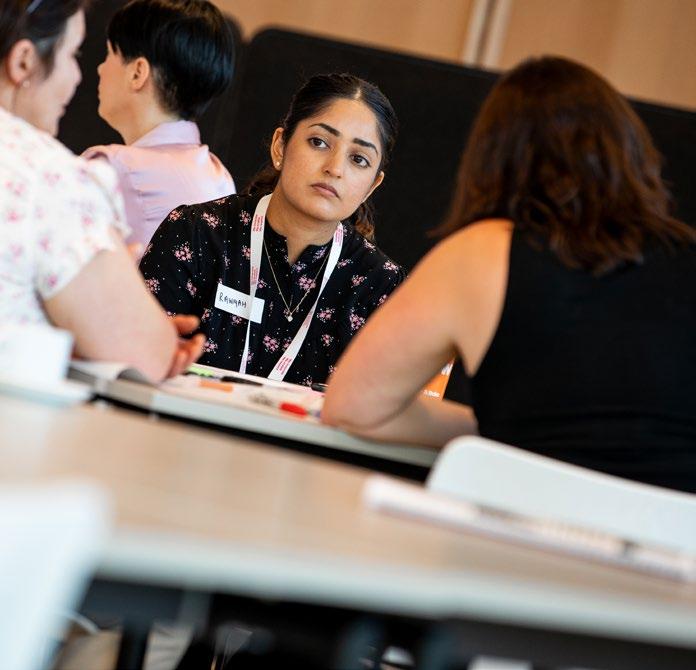

A session of learning, convened by the Citizens’ Convention on UK Democracy and organised by Involve with support from Kings College London, and a number of other civil society organisations including NatCen and Demos, took place in October 2023. More than 30 attendees including civil servants, politicians, influencers and Parliamentary officials, heard from Art O’Leary of the Irish Citizens’ Assembly and Iain Walker of New Democracy in Australia. After the event, a group of interested civil servants and Parliamentary officials started to share practice, expertise, skills and case studies to create a community and practice standards to guide participatory methods in government. This group formed the Parliamentary Methods Forum, now housed in the Cabinet Office. Through 2024 the Forum built its membership and created guidance on best practice shared with hundreds of civil servants. By spring 2024 it had over 80 members. Involve has taken a core advisory role to the Forum, supporting with evidence base and advocacy. Now the Forum is ready to provide effective advice on good practice participation to Ministers in government after the 2024 election.
• We convened more than 30 people to the October 2023 meeting and supported the Cabinet Office team to create the formal group which now meets monthly.
• We supported the original Cabinet Office team to generate case studies and identify how embedded participation already is within government.
• Two Permanent Secretaries were also established as sponsors of the Forum and invited to observe deliberative events, which enabled a wave of support for the Forum.
• We supported Parliamentary Select Committee clerks to develop strategy for participation and the Cabinet Office team to shape the individual group into a crossdepartmental Civil Service forum.
• Working with partners Demos, Involve has also started work on a Citizens’ White Paper, setting out good practice for the embedding of participation in government, Parliament and politics. The Forum will provide a soft landing and an influential place from which to share within government. We also hope that the paper will gain wider traction in the media, prompting shifts in wider society.


The Democracy Network is a network of people and organisations working on issues of power, democracy and voice in England, Scotland, Wales and Northern Ireland. Members of the network support each other to connect and collaborate, share and learn, build a way to agree ways forward, and take action and influence decision makers together.
The aim of the project is to help build a democracy in the UK fit for the 21st century, where more people have more influence over the decisions that affect our lives, more power and resources to improve our communities and where holding our politicians and governments to account is straightforward and accessible to all.
• In 2023/2024, in a first for the network, we launched a public-facing platform campaign preparing for the UK general election and the first 100 days of the next government. The campaign built understanding of and support for democratic renewal through community engagement workshops across the UK, meeting people where they are to build grassroots support for change.
• Addressed a historical weakness in the democracy sector's effectiveness in communicating with the public on democratic issues. The platform campaign specifically focused on shifting public understanding and building broader support for democratic renewal beyond traditional sector boundaries.
• In our third year, we significantly expanded engagement with 1,449 subscribers, 710 individual members, 101 organisational members, and 740 unique event attendees. In January 2024, we hosted our second annual conference, bringing together people and organisations for workshops on intersectional justice, transparency, integrity, ethical governance, and local democracy. We also improved The Democracy Network website to better integrate tools and resources, helping individuals and organisations in the democracy sector achieve their aims more effectively.
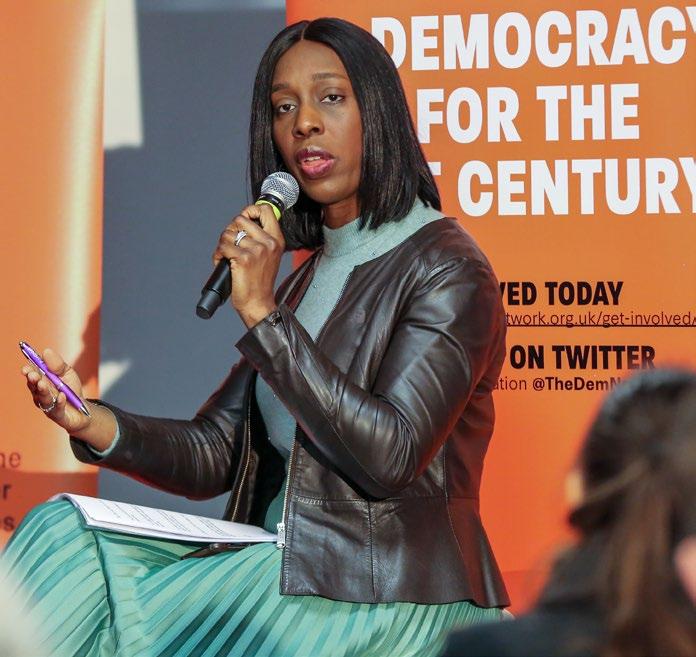
• This work creates a stronger democratic ecosystem through our growing programme of events, training, and activities that enable people and organisations to connect, stay informed, and work together for meaningful change.

Sciencewise is a programme led and funded by UK Research and Innovation (UKRI), and operated by Involve on their behalf, with our Consortium partners, the British Science Association (BSA) and the National Co-ordinating Centre for Public Engagement (NCCPE). Established in 2004, we have spent the past two decades supporting the delivery of public dialogue and engagement in science and technology policy and research in the UK. The programme has shifted the dial on our understanding of where power and agency should lie, when we as a society make decisions about the role of science and tech in our futures.
This year focused on consolidating what has been done, and developing a new strategy for the future of Sciencewise. We did this alongside running the programme, providing expertise and financial support to commissioners in research councils, government departments and other publicly funded bodies to do public engagement on topics across the science and technology spectrum.
But the work is not done. The Sciencewise programme continues to build the case that the public must be part of deciding how we use science, technology and data in years to come, particularly where technical advances have major moral or ethical implications. Through the programme, we have demonstrated that high quality public engagement is essential for strategy development, decision making, implementation and scrutiny of highly complex, future-focused issues.
• In 2023/24, Sciencewise completed five dialogues involving over 300 public participants and more than 5,000 participant hours of deliberation. Topics included research using early human embryos, Future Flight technologies, and ensuring digital identity services are trustworthy. The programme continues to inform strategic areas of public policy, with the Department for Science, Innovation and Technology's National Vision for Synthetic Biology referencing previous Sciencewise dialogues from 2010 and 2012.
• Sciencewise demonstrated the value of public dialogue to Research Council strategic theme leads, meeting with them throughout the year to support their thinking on using dialogue as a strategic development tool.
• Marking its 20th anniversary this year, Sciencewise has reflected on the mindsets it has shifted in wider society throughout it’s history. Through over 75 public dialogues, engaging over 8,000 members of the public in some 70,000 hours of in depth deliberation, 20 years of this programme has enabled diverse groups to engage with complex scientific issues, from climate change to genetic modification. This sustained effort has not only enhanced the transparency and inclusivity of scientific governance but also helped to build public trust in science, research and policymaking.
• For the 20th anniversary, we hosted a series of events that looked back on the last 20 years and looking at what should come next for Sciencewise a new 20 years of public voice on science, technology and innovation publication draws all of this together.


Feeling safe is vital for people to lead happy and healthy lives. And we know that minoritised and racialised communities are disproportionately impacted by crime and policing. In 2024, a reflective group of 45 local residents were tasked with considering the question: How can the police build trust with all communities and make Waltham Forest feel safer? The process was set up by the council and the police in response to issues of trust in the police and feelings of safety in the borough. The assembly considered evidence about safety and policing, and made recommendations for the changes that should be made. More widely, the considered curation of observers of the process and brokering of relationships created unlikely partnerships and drove civil service advocacy and new projects.
• An action plan will soon be published, with implementation plans for all recommendations. Two priority recommendations were taken forward immediately inclusive mentoring (council) and strengthening community engagement (police).
• The council plans to form a long-term citizen advisory group, which will be made partially from assembly members.
• The process showed positive signs of shifting mindsets within the police, with active support and interest by the new police borough commander, who spoke with three participants to learn about the process.
• Following the assembly, 98% of participants strongly agreed or agreed that citizens’ assemblies are an effective way of engaging people in decision making. 5 participants remain in active contact with Involve, and want to be involved with ongoing advocacy and volunteering.
• One participant has begun to do advocacy work for one of the speakers, who runs a support charity for families impacted by violence.
• We led a ‘lunch and learn’ on the process for the Home Office Innovation Lab. They have since commissioned a Sciencewise project on AI in policing. A community leader from the advisory group is now working directly with the Home Office to advise their policing dialogue work.
• Two civil service permanent secretaries who attended the assembly are now spearheading support for participatory methods in the civil service and are contributing to our Citizens’ White Paper with Demos. Two participants who work in the civil service have also joined the Participatory Methods Forum and are advocating for our work.


Involve has a strategic commitment to use our skills, time and experience to address big challenges.
Climate change is a major challenge of our time, and one where citizen engagement on both principles and practice is vital. Net Zero in particular risks becoming a polarised and politicised issue where there is little room for considered, inclusive decision making.
Involve’s approach offers a way through difficult issues like low emission zones in a way that centres social justice and equity.
This year our best practice public dialogue, deliberation and capacity building has made a real contribution to the change needed to respond to the climate and ecological crisis.
• Southampton Citizens’ Climate Assembly: Recommendations from our assembly, which will inform the council’s Local Transport Plan, included a metrostyle transport system and expanded cycling infrastructure.
• Hackney Citizens’ Jury on Extreme Heat: The jury recommended actions to protect vulnerable residents from extreme heat. The Council and partners have committed to progressing with recommendations from the jury, including a opening and promoting ‘cool spaces’; incentivising companies to exceed building regulations to raise environmental standards; an urban forest plan and targeted communications approach for those most vulnerable to extreme heat.
• West Midlands Combined Authority Greener Together Panel: The WMCA has taken outputs from panel sessions to inform their strategies and also to influence other organisations, like the Department for Environment, Farming and Rural Affairs. The air quality guiding principles have been used in the WMCA’s Air Quality Framework and implementation plan, for example.
• Seeing first-hand how deliberative methods can reduce polarisation and result in respectful dialogue and finding routes forward has influenced how officers engage on contentious transport issues in Southampton. Similarly, the local Business Improvement District (BID) are using the recommendations in their business engagement, noting the importance of its impartiality and independence.
• Local Climate Engagement (LCE) Programme: Our LCE programme is helping local local authorities and partnerships to plan, commission and deliver high quality public engagement in their climate decision making through a package of training, mentoring, peer learning and hands-on support.

Going forward climate change and nature will continue to be a strong focus for Involve. We are starting a new panel programme, giving citizens the chance to input into modelling for a low energy future, with the Energy Demand Research Centre at Lancaster University. We will continue our LCE programme – sharing our learning and entering a new phase with the creation of an open source resource hub of toolkits, guides and learning opportunities, which will be available to all local authorities in the UK. This will be an essential resource for our UKRI funded work with 25 new Local Authorities on engaging and empowering citizens on net zero.

This chapter summarises our funding and finances for 2023/24. It complements the detailed breakdown in our Statutory Trustees’ Report and Audited Accounts, which you can find on our website.
£807,427
million
Overheads (rents, ICT, governance, audit, etc.)
£212,898
We raised a total of £1.94m in 2023/24.
Our funding is a mix of consultancy and grant income, with a relatively small amount of donation and training income. Breakdown of funding in 2023/24.
Spending
We spent a total of £2.27 million in 2023/24
Expenditure this year reflects investment and planned delivery of major projects funded by restricted grants awarded in previous years. These funds were used to deliver on long -term commitments, resulting in higher expenditure this year but representing delivery of work and impact from previously secured income.
Who funded us
We believe in being transparent about the sources of our funding and purposes behind it. The following table sets out all of the funding we received during 2023/24 over £5,000.
Funder
UK Research and Innovation
Royal Borough of Kensington & Chelsea
London Borough of Waltham Forest
University of Southampton
West Midlands Combined Authority
Westminster City Council
Northern Gas Networks
Care Quality Commission
Scottish Government
Innovate UK
London Borough of Hackney
London Borough of Hounslow
Climate 2025
Belfast City Council
London Borough of Greenwich
Queens University Belfast
University of Gloucestershire
SONI
London Borough of Camden
Kings College London
University of Birmingham
Royal Academy of Engineering
London Borough of Camden
World Wildlife Fund
Sheffield City Council
University of Westminster
Amount What the funding was for
£258,056 Sciencewise
£135,055 Grenfell Restorative Justice Consultation
£126,706 Citizens' Assembly
£117,173 Citizens' Assembly
£117,080 Net Zero Citizens Panel
£88,621 Climate Assembly
£59,974 Public Panel
£44,934 System Focused Engagement
£44,764 Minimum Income Guarantee
£41,495 Thriving Places
£40,000 Citizen Jury
£29,979 Citizen Jury
£28,650 Future of Aviation Deliberative Workshop
£28,500 Co-Design Framework
£22,525 Community Engagement Strategy and Framework
£19,825 Environment and Brain Health Co-design
£18,748 Treescapes Project
£16,931 Community Forum
£21,545 Camden Housing and Property Panels
£14,194 Citizens' Convention on UK Democracy
£11,905 Local Policy Improvement Partnerships
£9,912 Landscape Review
£9,900 Camden Climate Panel
£8,815 People's Plan for Nature Follow Up Survey
£7,543 Support and Advice on the Approach to Public Participation
£5,000 Democracy Research Collaboration Toolkit
Funder Amount What the funding was for
Joseph Rowntree Reform Trust
Calouste Gulbenkian Foundation
Scottish Wildlife Trust
Joseph Rowntree Charitable Trust
Lancaster University
New Economics Foundation
University of Oxford
Joseph Rowntree Charitable Trust
The Royal Society For Arts
St Stephens Green Trust
Up for Yorkshire
Ashden
£165,580 Network for Democracy
£100,000 Local Engagement on Climate Change
£65,000 Riverwoods Project
£50,000 Core Funding
£40,001 Low Energy Futures Citizens' panel
£31,594 Conditionality in Welfare
£23,587 Fellowship on Impact of Citizens' Assemblies
£19,688 English Devolution Call to Action
£15,000 Rebooting Online Public Dialogue
£13,550 Democracy Innovators Network
£7,500 Our Zero Selby project
£5,985 UPPER Net Zero Thought Leadership


Take a look at our website for more resources around participation and deliberation.
Our Knowledge Base has lots of free guidance on the benefits of public participation, planning participatory processes, getting started with digital engagement, evaluating the impact of participation, how and why people participate and much more.
Find out more
Our collection of publications include handbooks, toolkits, reports and policy notes that share good practice in engagement and participation, such as our community engagement handbook for investors, a practical guide on climate engagement and our proposals for how to put citizens at the heart of improving and enforcing rules for MPs.
Find out more
Our methods library outlines over 50 different participatory and deliberative methods, including what they are, when they should be used, their strengths and weaknesses and what they cost.
Find out more
Our tailored training helps organisations, institutions and authorities to develop their skills and understanding of participatory, dialogue and deliberative public engagement processes, facilitation skills, specific engagement methods like World Café or co-production, and more.
Find out more
Our Engagement and Participation Network (EPN) will offer a home for people doing public participation and engagement in the UK. We are currently seeking funding to co-create the network with other organisations, institutions and individuals that practise public participation and engagement. You can express interest in joining now on our website.
Find out more
In the coming year we will begin work on ‘Thriving Places’, our most ambitious climate engagement initiative yet. This groundbreaking collaboration with 25 local authorities across the UK will revolutionise how communities shape their net zero futures. This innovative project, funded by Innovate UK, will support local authorities across the Country to create a citizen vision for their area that guides their decision making, ensuring it’s based on what people want.
This is an exciting, far-reaching project for Involve and its partners and we are really looking forward to working alongside a variety of local authorities and communities to achieve far reaching net zero solutions that are inclusive, just and work for communities.
The School for Everyday Democracy represents exciting new territory for Involve our first programme dedicated to training grassroots champions to drive change in their own communities. Through decades of facilitating citizens' assemblies and juries, we've witnessed transformative moments when participants realise they have the right, ability, and opportunity to make a difference, and when people from vastly different backgrounds discover they can work together.
Now, partnering with community organising experts Act Build Change, we're building on these powerful moments to equip 100 people from communities furthest from power with the skills, confidence, and networks to become Everyday Democracy Champions across all four UK nations helping shift the balance of power for a more inclusive and participatory democracy.
The next year will mark a significant milestone for Involve as we celebrate two decades of pioneering participatory democracy in the UK. This important anniversary will provide an opportunity to reflect on our journey from early innovations in public engagement to today's expanding movement for democratic renewal while asking crucial questions about where we find ourselves now and what the future holds for participation, deliberation, and Involve's evolving role in strengthening democracy across the UK.
InvolveFDN @involveuk
uk.linkedin.com/company/involveuk
www.involve.org.uk | info@involve.org.uk
•
•
•